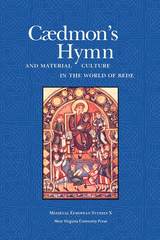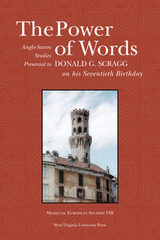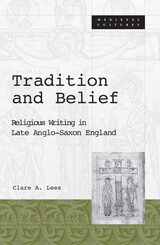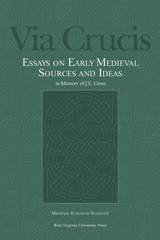
From the first centuries of Christianity, believers turned to the perfection modeled by saints for inspiration, and a tradition of recounting saints’ Lives flourished. The Latin narratives followed specific forms, dramatizing a virgin’s heroic resolve or a martyr’s unwavering faith under torture.
In early medieval England, saints’ Lives were eagerly received and translated into the vernacular. The stories collected here by unknown authors are preserved in manuscripts dating from the eleventh and twelfth centuries. They include locally venerated saints like the abbess Seaxburh, as well as universally familiar ones like Nicholas and Michael the Archangel, and are set everywhere from Antioch to Rome, from India to Ephesus. These Lives also explore such topics as the obligations of rulers, marriage and gender roles, private and public devotion, the environment, education, and the sweep of human history. This volume presents new Old English editions and modern English translations of twenty-two unattributed saints’ Lives.


A contemporary edition and translation of one of the great monuments of Old English literary and religious culture.
The homilies of the monk Ælfric, written in the last decade of the tenth century, offer some of the most important prose writing in Old English. They convey mainstream Christian thought at the turn of the millennium, a distillation of the spiritual inheritance of the English Church before the Norman Conquest and during a time of monastic reform. The homilies cover a broad range of topics, from biblical exegesis to saints’ lives to general Christian history, with a strong focus on the Gospel reading at Mass, explained in language that laypeople could understand. Ælfric is famous for his lucid prose, which he later developed into a rhythmical and alliterative style that has often been likened to verse.
In his first series of Catholic Homilies, Ælfric drew on the works of Church Fathers such as Augustine, Gregory, and Bede to create forty sermons for use throughout the church year. This is the first complete translation of the Catholic Homilies since 1844, presented alongside the newly edited Old English text.




The Power of Words: Anglo-Saxon Studies Presented to Donald G. Scragg on his Seventieth Birthday edited by Jonathan Wilcox and Hugh Magennis will find its place on the same shelf with these and other such valuable tomes in the discipline. This is a complex and carefully edited book, that showcases the work of some of Professor Scragg’s best students and most admiring professional friends. The contents range from several studies in homiletic literature, one of Professor Scragg’s own passions, to other of his pursuits, including editing theory and orthography. These are not, however, derivative essays that recommend a single adjustment in a reading or to a source study; instead, they are studies that do what Professor Scragg himself did: they observe clues to larger realities, and they point the way to a broader comprehension of our discipline and its several methodologies.

Looks at early religious texts and their influence on medieval literature and culture.
Looks at early religious texts and their influence on medieval literature and culture.
In this major study of Anglo-Saxon religious texts-sermons, homilies, and saints’ lives written in Old English-Clare A. Lees reveals how the invention of preaching transformed the early medieval church, and thus the culture of medieval England. By placing Anglo-Saxon prose within a social matrix, her work offers a new way of seeing medieval literature through the lens of culture.To show how the preaching mission of the later Anglo-Saxon church was constructed and received, Lees explores the emergence of preaching from the traditional structures of the early medieval church-its institutional knowledge, genres, and beliefs. Understood as a powerful rhetorical, social, and epistemological process, preaching is shown to have helped define the sociocultural concerns specific to late Anglo-Saxon England.The first detailed study of traditionality in medieval culture, Tradition and Belief is also a case study of one cultural phenomenon from the past. As such-and by concentrating on the theoretically problematic areas of history, religious belief, and aesthetics-the book contributes to debates about the evolving meaning of culture.ISBN 0-8166-3002-X Cloth £34.50 $49.95xxISBN 0-8166-3003-8 Paper £14.00 $19.95x232 Pages 5 7/8 x 9 NovemberMedieval Cultures Series, volume 19Translation inquiries: University of Minnesota Press
This book originated as a series of papers delivered at a Symposium on Irish and Anglo-Saxon Literary Culture in Honor of J. E. Cross, held in conjunction with the 30th International Congress on Medieval Studies at Kalamazoo in May 1996. The purpose of that symposium was to bring together a number of friends and admirers of Professor Cross to celebrate his remarkably rich career as a scholar of Old English and Insular Latin literature; Anglo-Saxon manuscripts; and medieval sermons, saints’ lives, and apocrypha.
READERS
Browse our collection.
PUBLISHERS
See BiblioVault's publisher services.
STUDENT SERVICES
Files for college accessibility offices.
UChicago Accessibility Resources
home | accessibility | search | about | contact us
BiblioVault ® 2001 - 2024
The University of Chicago Press









